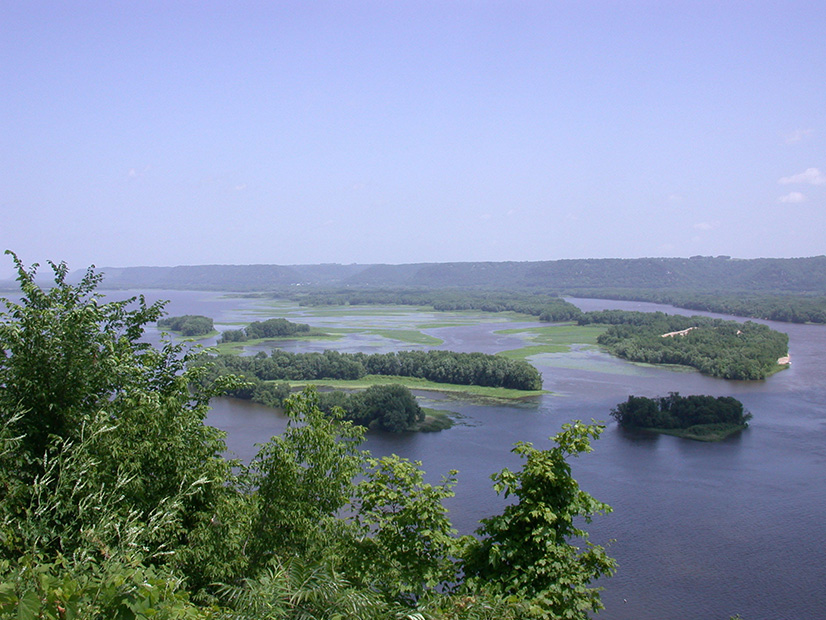A federal judge on Monday put on hold the hotly contested Cardinal-Hickory Creek transmission project slated to cut through southwestern Wisconsin after he determined that environmental destruction is likely to occur.
U.S. District Judge William Conley, with the Western District of Wisconsin, said right-of-way deforestation along portions of the route will destroy the Driftless Area’s federally protected wetlands and issued a preliminary injunction (21-cv-096-wmc).
Project developers American Transmission Co. (ATC), ITC Midwest and Dairyland Power Cooperative had planned to begin clear-cutting the Wisconsin portion of the nearly $500-million, 101-mile 345-kV line from Dubuque County, Iowa, to Dane County, Wisconsin.
Conservation groups Wisconsin Wildlife Federation, Driftless Area Land Conservancy (DALC), National Wildlife Refuge Association, and Defenders of Wildlife argued in May that the developers and the U.S. Army Corps of Engineers had ignored adverse environmental impacts. They argued that the line’s environmental impact statement, prepared by the U.S. Department of Agriculture’s Rural Utilities Service, did not comply with the National Environmental Policy Act (NEPA) and that its right-of-way permitting violated the National Wildlife Refuge System Improvement Act.
The groups also said the Corps ran afoul of NEPA, the Endangered Species Act and the Clean Water Act by issuing permits for line construction despite known environmental harms. They said the Corps failed to meaningfully address project alternatives.
Conley agreed that irreversible environmental damage was likely to occur if the deforestation went ahead as scheduled on wooded wetland areas.
“While defendants assure the court that best construction practices and mitigation will be used, that does not change the fact that some harm will come to the environment,” he wrote. “Specifically, even the first stage of construction will involve ground clearing, which in and of itself causes harms that are acknowledged in the environmental impact statement, which the Corps signed.”
Conley said that the potential damage in this case “relates to the destruction of ecosystems, wetlands, and habitats, and simply awarding damages cannot repair fragile ecosystems that are harmed.” He added that “money cannot reverse soil erosion or reintegrate fragmented habitats.”
He said the Corp’s Utility Regional General Permit contains “no evidence of even cursory analysis of the cumulative impact” if the line is built near federal waters.
Conley acknowledged that developers have been clearcutting a 15-mile stretch of the route in northeastern Iowa since April.
But he said ATC, ITC and Dairyland should not have acted as if the line were an inevitability and taken for granted that they would sail through a permitting process. Conley said the developers don’t yet have permission to clear or build in the Upper Mississippi River National Fish and Wildlife Refuge, where the line’s Iowa and Wisconsin portions meet, and he said the refuge’s protected status likely represents the conservation groups’ best defense against some line construction.
Conley said developers could have paused their timeline rather than give the groups the minimum 30-day notice of their intent to begin work. He said the “limited” monetary damages of a preliminary injunction “are unlikely to outweigh the permanent damage threatened.”
ATC, ITC and Dairyland estimated that a 30-day injunction would lead to $3.1 million in damages and a 60-day injunction would cause them $12.72 million in damages.
Environmental Law and Policy Center attorney Howard Learner, representing the conservation groups, said the injunction halts developers from damaging more than 100 wetlands along the line’s path.
He said he was encouraged by Conley’s opinion that the Upper Mississippi River Wildlife Refuge is probably an inappropriate backdrop for 20-story transmission towers.
“That will require the federal government agencies to robustly explore and objectively evaluate better, less expensive and less environmentally damaging alternatives. That should have been done before, and, if the District Court’s final decision is aligned with the preliminary injunction opinion, then it will be required soon,” he said in a statement. “The court’s preliminary injunction decision is well-grounded in both law and common sense. It is in the public interest and can better protect both the environment and ratepayers.”
Learner said ATC and ITC “should hit the pause button” while the court readies a final opinion over the next 30 to 60 days.
In a joint statement, ATC, ITC and Dairyland said while they were “disappointed” with the injunction, it affects fewer than 16 acres of the 87-mile Wisconsin route. The trio said they “voluntarily agreed to avoid construction in these wetlands until Nov. 29 as a showing of good faith and cooperation to the court and other parties,” but they also said they would continue project construction on the land unaffected by the injunction.
They said they remain convinced the project stands on its merits and said more than 17 GW of renewable generation is dependent on its construction.
“The Cardinal-Hickory Creek project is needed more today than when initially approved by the Public Service Commission of Wisconsin in 2019,” the developers said. “The utilities are committed to completing this project, which will reduce energy costs, improve electric grid reliability, relieve congestion on the transmission system, support decarbonization goals and help support the interconnection of renewable generation in the Upper Midwest.”
The Cardinal-Hickory Creek project is the last of MISO’s 2011 multi-value projects in line for a ribbon-cutting ceremony. ATC, ITC and Dairyland have been trying since 2012 to build the line; DALC and the Wisconsin Wildlife Federation have been fighting in court for years against the line. (See Environmental Groups Divided on Cardinal-Hickory Creek Line.)
The project suffered a separate setback earlier this year when developers ATC and ITC uncovered evidence of encrypted messages between their employees and former Wisconsin Commissioner Mike Huebsch. (See Former Wis. Commissioner’s Texts Imperil Cardinal-Hickory Creek Line.) The incident forced the companies to redo the project’s certificate of public convenience and necessity.




